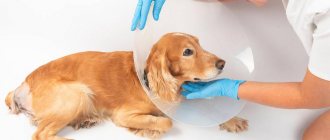A pet is a full-fledged member of the family, whose health problems always cause anxiety and concern for the owner. Signs of poor health vary, from excessive sleepiness to refusal to eat and nausea. From this article you will learn about why a dog’s stomach growls, what provokes this phenomenon, as well as the most effective treatment methods.
General information about the reasons
Veterinarians are convinced that stomach churning is not an independent illness, but only a background symptom, symbolizing the fact that some pathogenic processes are occurring in the dog’s body. Statistics have shown that the most common reason for a dog's stomach to rumble is flatulence. Representatives of large breeds are especially vulnerable to this disease, although sometimes it is diagnosed in small individuals.
In addition, the cause of rumbling can be poisoning of varying severity, as well as banal overeating and an unbalanced diet. Experts reassure owners that if a pet has gurgling sounds in the abdominal cavity once a day, then this is quite normal. It’s another matter if a dog’s stomach growls intensely and constantly - this is already a serious reason to take it to a doctor for examination.
Symptoms often accompanying this phenomenon include diarrhea and vomiting, lethargy of the animal, complete or partial refusal to eat, as well as prolonged constipation, and ignoring the owner’s attempts to play or cheer up the four-legged friend. That is, owners should pay attention to the signs of unhealthy health in their entirety, and not individually, and only then decide whether to go to a veterinary hospital.
Why does a dog's stomach growl: non-dangerous reasons
All non-dangerous reasons are associated with the characteristics of the pet and errors in its feeding. In both cases, you can deal with the problem on your own.
Great hunger
Rumbling sounds due to prolonged starvation disturb not only animals, but also their owners. In fact, the gastrointestinal tract issues them on an ongoing basis. During the process of active digestion, the sound is muffled by food, so after it is dissolved or eliminated, audibility increases.
Binge eating
The opposite situation is also possible. Eating too much food requires more gastric juice to digest. The number of intestinal bacteria also increases, contributing to increased gas formation.
Rapid swallowing of food, air entering the stomach
Hasty eating of food is typical for pets who eat twice a day. Due to the approaching hunger, they greedily pounce on food, forgetting about thorough chewing. Along with pieces of food, a lot of air enters the stomach. The excess part comes out either in the form of belching or along with gases.
Quick, sloppy drinking
A similar situation occurs when drinking quickly. Here, in addition to rumbling, a characteristic gurgling sound often appears.
Flatulence
Bloating in a dog is scientifically called flatulence. It is provoked by factors such as intoxication of the body, consumption of low-quality food and cheap industrial feed, as well as dysfunction in the gastrointestinal tract. If treatment aimed at eliminating flatulence is not provided to the dog on time, the consequences can be very severe. These include volvulus, esophageal obstruction and heart failure. Moreover, dysfunction of the heart muscle is caused by a violation of the outflow of venous blood and can lead to the death of the dog.
Forms
Experts distinguish three forms of pathology. Each of them is characterized by an abundant accumulation of gases in the intestines, and at the same time the dog’s stomach growls loudly. Let's look at each of them in more detail:
- Chronic flatulence. At first, nothing happens, the pathology does not reveal its presence in any way, and the puppy or adult does not experience any particular discomfort. It gurgles in the stomach extremely rarely; when walking, the owner can notice that the pet has diarrhea. In advanced cases, the disease leads to malfunctions of the endocrine system, especially the liver and thyroid gland. Enzymes are poorly produced, which complicates the digestion process.
- The delayed form is in many ways reminiscent of the chronic form of the disease. The dog's stomach growls loudly, it refuses food, becomes apathetic and lethargic. It is rare and quite difficult to diagnose, since the disease progresses smoothly, without significant symptoms.
- Acute form. It poses a serious threat to the dog's life, but is relatively easy to diagnose. The animal's behavior changes, it becomes restless, and often whines. Characteristic signs are severe vomiting, diarrhea, the pet does not eat and prefers to lie in one place. The gums change color and become painfully bluish. Urgent hospitalization of the pet is required.
Causes
The main causes of flatulence include factors such as:
- allergic reactions caused by food to the components of which the dog’s body is sensitive;
- swallowing air, which occurs due to the fact that the pet quickly absorbs food. Over time, it accumulates in the gastrointestinal tract, causing bubbling sounds in it;
- poorly balanced diet, especially for ready-made feeds that contain soybeans;
- gastrointestinal pathologies. With them, the stomach has difficulty digesting and absorbing food, which causes it to rot inside the intestines, causing the accumulation of gas in it.
Treatment
If a dog suffers from constant rumbling in his stomach, then he should be immediately taken to a specialist for examination. The doctor will conduct a clinical examination of the patient, collect anamnesis, and take blood and stool for analysis. A mandatory measure if swelling is suspected is an x-ray. It is strictly not recommended to try to treat the dog yourself, especially if the symptoms are severe, as this can be an acute form of the disease that can lead to the death of the animal.
After making a diagnosis, the veterinarian will prescribe such effective pharmaceuticals for your pet as Nux vomica and Cardus compositum. The dosage depends on the current condition of the pet and its weight. A properly formulated diet also helps get rid of flatulence. For the first 1-2 weeks, the dog should sit on liquid porridge, then it can be switched to more solid food. It is important to understand that control over what food your pet eats is the key to the health of its intestines and the best measure to prevent bloating.
Many owners often ask the question, how to help a pet get rid of bloating using folk remedies? If your dog's stomach regularly growls, then it is acceptable to use such remedies as cabbage juice and chamomile infusion. The substances they contain have a beneficial effect on intestinal function, which will make the animal quickly feel better.
Treatment
The treatment strategy depends on the cause of the pathology. For flatulence, the dog is given sorbents (Enterosgel, Polysorb, activated carbon), the carminative drug Espumisan or Simethicone is given as an ambulance, and the stomach is washed out. For diarrhea, Loperamide and Smecta come first. Jogging helps. In severe cases, a needle is used to pierce the abdominal cavity to release gases. The cause of the pathology is determined and specific treatment is prescribed.
Much attention is paid to nutrition. The diet includes food that coats the walls of the stomach: flax seeds, oatmeal and rice porridge, oat jelly. Chamomile decoction is added to liquid food. Exclude milk, dry food, legumes, and fish from the diet.
To help your pet recover faster, increase the duration of walks.
For dysbacteriosis, probiotics and prebiotics are given: Lactoferon, Bifidum SHS, FortiFlora, Vetelakt, Viyo.
Worms are removed with anthelmintic drugs. Pyrantel, Prasitel, Fenbendazole, Prazicide, Milbemax are effective. It is not advisable to use folk remedies. What is suitable for humans may be contraindicated for dogs, for example, garlic.
In case of poisoning, the stomach is washed, enemas are given, diuretics and laxatives are given, and a diet is prescribed. Intestinal infections are treated with antibiotics, sometimes Metronidazole is used.
To relieve intestinal spasms, drugs with belladonna extract, Bellastesin tablets, and Becarbon are used. Almagel and Gastrofarm help with gastroenteritis.
In all cases, they provide gentle fractional nutrition, avoiding diversity in the diet.
Poisoning
The entry of toxic substances into the pet’s body may be one of the reasons why the dog’s stomach began to grumble. Poisoning is often caused by cheap industrial food, the stomach’s rejection of certain food components, as well as the dog’s accidental eating of poison-filled bait on the street. Veterinarians warn that intoxication of the body is not always caused solely by food reasons. Sometimes it is caused by insect bites and toxin getting on the skin of the animal.
Symptoms
Symptoms of poisoning in a dog include:
- increased body temperature;
- severe malaise, chills;
- your pet's stomach is rumbling very loudly;
- convulsions;
- diarrhea, vomiting;
- difficulty breathing and profuse sweating;
- apathy, lethargy.
Treatment
It is extremely important for owners to know what to do if the dog’s stomach is rumbling and all the signs of intoxication are visible on the face. It is this information that can save your pet from death. If time permits, you need to promptly take the animal to a doctor for examination. It also happens that you need to act on your own. In this case, the first thing you need to do is induce vomiting in the dog; a saline solution will help with this. Additionally, it is permissible to give an enema and then give the dog activated charcoal. When the condition stabilizes, take your pet to a veterinary hospital.
Where to contact
This problem is best dealt with by a specialist – a veterinary gastroenterologist.
Doctors of this specialty are available in all major veterinary clinics. When making an appointment, you need to ask whether the clinic has its own laboratory and ultrasound machine. In Moscow, these can be veterinary clinics: Bely Klyk, Biocontrol, Svoy Doktor, Zoovet, Medvet .
In St. Petersburg, you can contact the clinic named after A. Fillmore, the veterinary clinic of Dr. Sotnikov, Pride .
Quantity
Share this post
Tweet
You may also like…
- Dog cleaning
Binge eating
Animals that eat too much often suffer from rumbling stomachs. Over time, this factor leads to the pet becoming overweight. A striking symptom of systematic overeating is vomiting, which in this case is the body’s natural reaction to an excess of food.
To prevent your pet's intestines from rumbling, abandon the practice of giving him large portions of food. It is better to feed him more often, but not so much. Veterinarians advise including soft and liquid food in your four-legged friend’s diet to aid the digestion process. While solid foods cause constipation and gas accumulation.
Who's at risk
The following breeds are genetically predisposed to flatulence:
- Saint Bernard;
- boxer;
- Rottweiler;
- some types of shepherd dogs;
- English and French bulldogs;
- English Mastiff;
- soft coated terrier;
- beagle;
- basset hound;
- pug.
Sedentary and obese dogs are at risk. Short-nosed breeds swallow a lot of air while eating, which is why they experience frequent flatulence (fart a lot).
Intestinal parasites
Parasites that live in a dog's gastrointestinal tract include worms (tapeworms, whipworms), Giardia, coccidia and cryptosporidium. Having settled in the dog’s intestines, they begin to actively multiply, feeding on incompletely digested food masses, thereby robbing the pet of useful and nutritious substances.
If the disease is not treated, then over time, less and less food mass will remain in the lumen of the dog’s intestines, which will lead to an abundant accumulation of gases. This is also facilitated by the fact that helminths are capable of “poisoning” the host with their toxins produced during their life. The more gas accumulates, the louder your stomach will grumble. However, getting rid of worms and harmful microorganisms is not as difficult as it might seem at first glance.
At the first symptoms, take the animal to the doctor, where, after examining its stool, the veterinarian will be able to accurately determine what type of parasite has settled in the pet’s body. This will make it easier to build a therapeutic regimen that prescribes the right type of deworming treatment for your dog. Additionally, the doctor may prescribe a course of supporting vitamins and probiotics for the dog. With their help, the pet will return to normal much faster.
Video
Currently, stomachs and intestines are highly susceptible to various diseases, which, if improperly treated or poorly attended by the owner, can lead to the death of the animal. Various foods, toxic and chemical substances, environmental pollution, infections, parasites, viruses and much more can instantly affect the condition of the dog’s digestive tract, which in turn requires an immediate response from the animal’s owner. Sensitive guidance, attention, care and love are very important for your pet, because his life depends on it.
Do not self-medicate, and if in any doubt, contact a specialist at a veterinary clinic.
Prevention measures
Preventative measures to avoid grumbling are quite easy to implement. These include expert recommendations such as:
- Food must be given in small portions. If the dog eats quickly and greedily, then cut the food finely, this will prevent excess air from entering the intestines.
- After an intense and long walk, do not allow the animal to drink water immediately. Wait half an hour, only then let him near the bowl of liquid.
- Try to avoid dry food. It’s much better if the owner cooks for his shaggy friend himself. The diet should be balanced and nutritious. Give your dog vegetables and fruits; the fiber they contain has a beneficial effect on intestinal function.
- Don’t be lazy and conduct research in a veterinary hospital to see what products can cause an allergic reaction in a dog. Then completely exclude them from the animal's menu.
- While walking, be careful to ensure that your dog does not eat anything from the ground. It is acceptable to wear a muzzle for a walk; it will reliably protect the dog from the risk of poisoning.
- Deworm regularly.
Finally, I would like to say that regular rumbling in the stomach is a serious symptom that requires attention from the owner. If this lasts a long time and the pet refuses to eat, has diarrhea and severe vomiting, then urgently take him to the veterinarian for an examination. Otherwise, the consequences can be very sad.
Therapy with a specialist
When contacting, the veterinarian will examine the symptoms bothering the animal and determine the causes of the disease. In addition, he will analyze your diet.
Gastritis
If gastritis is diagnosed, a fasting diet is prescribed for 1 or 2 days. Water is not limited.
- gastric lavage. Use 1% sodium chloride solution, 0.05% lactic acid solution or potassium permanganate;
- taking 1 tablespoon of natural gastric juice or plantaglucide;
- antibiotics or sulfa drugs;
- taking vitamins, enzymes;
- dieting. Course - 1 month.
The same thing if the diagnosis is gastroenterocolitis, poisoning and ulcer.
Intestinal blockage
- surgical intervention to remove foreign bodies;
- oily and mucous agents are prescribed;
- warm enemas with soapy water and disinfectants.
Hepatosis
- a diet excluding fish, bones, dry food, spices, fats, oils, bread;
- Lipotropic, vitamin and choleretic drugs are prescribed.
Cirrhosis of the liver
- the diet consists of easily digestible feed with plenty of proteins and vitamins;
- drug treatment in later stages is not effective;
- prescribe hepatoprotectors that will alleviate the condition;
- Choleretic drugs are widely used.











